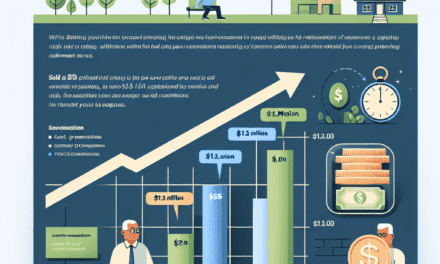“Super Micro Faces Nasdaq Delisting: Racing Against the Clock to Secure Compliance”
Introduction
Super Micro Computer, Inc., a prominent player in the high-performance computing solutions sector, is facing potential delisting from the Nasdaq Stock Market as a critical compliance deadline looms. The company, known for its innovative server and storage solutions, has been under scrutiny due to its failure to meet certain regulatory requirements set by the exchange. As the deadline approaches, Super Micro is under pressure to address these compliance issues to avoid the significant financial and reputational repercussions that could arise from being delisted. This situation has garnered attention from investors and industry analysts, who are closely monitoring the company’s efforts to rectify its standing with Nasdaq and ensure its continued presence on the prestigious exchange.
Understanding Nasdaq Delisting: What It Means for Super Micro
Super Micro, a prominent player in the technology sector, is currently grappling with the looming threat of delisting from the Nasdaq Stock Market. As the deadline approaches, stakeholders are keenly observing the unfolding situation, which could have significant implications for the company and its investors. Understanding the intricacies of Nasdaq delisting is crucial to comprehending the potential impact on Super Micro and its future prospects.
Nasdaq, one of the world’s leading stock exchanges, has stringent listing requirements that companies must adhere to in order to maintain their status. These requirements encompass various financial and governance criteria, including minimum bid price, market value, and timely filing of financial reports. When a company fails to meet these standards, it risks being delisted, which can lead to a loss of investor confidence and reduced liquidity in its shares. For Super Micro, the threat of delisting arises from its recent struggles to comply with certain Nasdaq regulations, particularly those related to financial reporting.
The implications of a potential delisting for Super Micro are multifaceted. Firstly, delisting could significantly impact the company’s stock price, as investors may perceive it as a sign of instability or financial distress. This perception could lead to a sell-off, further exacerbating the company’s financial challenges. Moreover, being delisted from a major exchange like Nasdaq could limit Super Micro’s access to capital markets, making it more difficult to raise funds for future growth and expansion. This could hinder the company’s ability to invest in research and development, potentially stalling innovation and competitiveness in the fast-paced technology sector.
Furthermore, delisting could also affect Super Micro’s relationships with key stakeholders, including customers, suppliers, and partners. These entities may view delisting as a red flag, prompting them to reassess their engagements with the company. In turn, this could disrupt business operations and supply chains, further complicating Super Micro’s efforts to navigate the challenges it faces. Additionally, the reputational damage associated with delisting could have long-term consequences, as rebuilding trust and credibility in the market can be a daunting task.
However, it is important to note that delisting is not an immediate or irreversible process. Nasdaq typically provides companies with a grace period to rectify their deficiencies and regain compliance with listing standards. During this period, Super Micro has the opportunity to take corrective actions, such as improving its financial reporting practices or implementing strategic initiatives to boost its stock price. By doing so, the company can potentially avert delisting and restore investor confidence.
In light of these considerations, Super Micro’s management is likely to be actively engaged in efforts to address the issues at hand. This may involve working closely with financial advisors, auditors, and legal experts to ensure compliance with Nasdaq’s requirements. Additionally, transparent communication with investors and stakeholders will be crucial in maintaining trust and demonstrating the company’s commitment to resolving the situation.
As the deadline for compliance approaches, the outcome remains uncertain. Nevertheless, understanding the potential ramifications of Nasdaq delisting provides valuable insight into the challenges and opportunities that lie ahead for Super Micro. By navigating this complex landscape with diligence and strategic foresight, the company can strive to secure its position in the market and continue its trajectory of growth and innovation.
The Impact of Delisting on Super Micro’s Stock Performance
Super Micro, a prominent player in the technology sector, is currently grappling with the looming threat of delisting from the Nasdaq stock exchange. As the deadline for compliance approaches, investors and market analysts are closely monitoring the situation, given the potential ramifications for the company’s stock performance. Delisting from a major exchange like Nasdaq can have significant consequences, not only for the company’s market valuation but also for its reputation and investor confidence.
The primary concern for Super Micro is the potential loss of liquidity that accompanies delisting. Stocks listed on major exchanges benefit from higher visibility and greater trading volumes, which in turn facilitate easier buying and selling for investors. If Super Micro were to be delisted, its shares would likely be relegated to over-the-counter (OTC) markets, where trading volumes are typically lower. This shift could lead to increased volatility and wider bid-ask spreads, making it more challenging for investors to execute trades at favorable prices. Consequently, the reduced liquidity might deter institutional investors, who often require the ability to move large volumes of shares without significantly impacting the stock price.
Moreover, delisting could adversely affect Super Micro’s ability to raise capital. Companies listed on major exchanges have greater access to capital markets, enabling them to issue new shares or debt to fund growth initiatives. A delisting could limit these opportunities, as potential investors might perceive the company as a higher risk. This perception could lead to higher borrowing costs or reduced interest from potential investors, thereby constraining Super Micro’s financial flexibility.
In addition to financial implications, delisting could also tarnish Super Micro’s reputation. Being listed on a prestigious exchange like Nasdaq is often seen as a mark of credibility and stability. Losing this status might raise questions about the company’s governance, financial health, or compliance with regulatory standards. Such concerns could erode investor trust and lead to a decline in the stock’s valuation, as market participants reassess the risks associated with holding Super Micro shares.
Furthermore, the potential delisting comes at a time when the technology sector is facing heightened scrutiny and volatility. With global economic uncertainties and rapid technological advancements, investors are increasingly cautious about where they allocate their capital. In this context, any negative news surrounding Super Micro could exacerbate existing market apprehensions, leading to further downward pressure on its stock price.
However, it is important to note that delisting is not an irreversible process. Companies can take corrective actions to regain compliance with exchange requirements and eventually relist. For Super Micro, this might involve addressing any underlying issues that led to the delisting threat, such as financial reporting discrepancies or governance concerns. By demonstrating a commitment to transparency and regulatory compliance, the company could potentially restore investor confidence and improve its stock performance over time.
In conclusion, the prospect of delisting poses a multifaceted challenge for Super Micro, with potential impacts on liquidity, capital-raising capabilities, reputation, and overall stock performance. As the deadline approaches, the company’s management will need to navigate these challenges carefully to mitigate adverse effects and reassure investors. The coming weeks will be crucial in determining whether Super Micro can avert delisting and maintain its standing in the competitive technology sector.
How Super Micro Plans to Address Nasdaq’s Concerns
Super Micro, a prominent player in the technology sector, is currently grappling with the looming threat of delisting from the Nasdaq Stock Market. This situation has arisen due to the company’s failure to meet certain compliance requirements set forth by the exchange. As the deadline for rectifying these issues approaches, Super Micro is actively formulating a comprehensive strategy to address Nasdaq’s concerns and ensure its continued presence on the prestigious exchange.
To begin with, one of the primary concerns highlighted by Nasdaq pertains to Super Micro’s financial reporting practices. The company has faced challenges in timely filing its financial statements, which has raised red flags for the exchange. In response, Super Micro is taking decisive steps to enhance its financial reporting infrastructure. This includes the implementation of more robust internal controls and the recruitment of additional financial experts to ensure accuracy and timeliness in future filings. By strengthening its financial reporting mechanisms, Super Micro aims to restore investor confidence and demonstrate its commitment to transparency and accountability.
Moreover, Super Micro is also focusing on improving its corporate governance framework. Recognizing the importance of strong governance in maintaining investor trust, the company is revisiting its board composition and governance policies. This involves appointing independent directors with relevant expertise to provide oversight and guidance. Additionally, Super Micro is revising its governance policies to align with best practices, thereby reinforcing its commitment to ethical business conduct and responsible management. Through these measures, the company seeks to address Nasdaq’s concerns regarding governance and underscore its dedication to upholding high standards of corporate responsibility.
In tandem with these efforts, Super Micro is engaging in open and constructive dialogue with Nasdaq. By maintaining transparent communication with the exchange, the company aims to provide regular updates on its progress in addressing the identified issues. This proactive approach not only demonstrates Super Micro’s willingness to cooperate but also helps in building a positive rapport with Nasdaq. Furthermore, the company is seeking external advisory support to navigate the complexities of compliance and ensure that all necessary steps are taken to meet Nasdaq’s requirements. By leveraging expert guidance, Super Micro is better positioned to address any lingering concerns and secure its continued listing on the exchange.
Additionally, Super Micro is placing a strong emphasis on strategic growth initiatives to bolster its financial performance. By focusing on innovation and expanding its product offerings, the company aims to enhance its competitive edge and drive revenue growth. This strategic focus not only addresses Nasdaq’s concerns about financial stability but also positions Super Micro for long-term success in the dynamic technology landscape. By demonstrating a clear path to sustainable growth, the company seeks to reassure investors and stakeholders of its resilience and potential for future success.
In conclusion, as the deadline for addressing Nasdaq’s concerns draws near, Super Micro is leaving no stone unturned in its efforts to remain listed on the exchange. Through a multifaceted approach that includes strengthening financial reporting, enhancing corporate governance, maintaining open communication, and pursuing strategic growth, the company is taking significant strides to address the issues at hand. By doing so, Super Micro aims to not only meet Nasdaq’s requirements but also reinforce its position as a trusted and reliable player in the technology sector. As these efforts unfold, the company remains optimistic about its ability to overcome the current challenges and continue its journey of growth and innovation.
Investor Reactions to Super Micro’s Potential Delisting

As the deadline for Super Micro’s compliance with Nasdaq listing requirements looms, investor reactions have been varied, reflecting a mix of concern, speculation, and cautious optimism. The potential delisting of Super Micro, a prominent player in the technology sector, has sparked significant discourse among stakeholders, with many weighing the implications for their investment portfolios. The company’s current predicament stems from its failure to meet certain regulatory and financial reporting standards mandated by Nasdaq, a situation that has not only affected its stock performance but also its reputation in the market.
Investors, particularly those with substantial holdings in Super Micro, are understandably anxious about the potential consequences of a delisting. Such an event could lead to reduced liquidity and a narrower pool of potential buyers, making it more challenging to trade shares. Moreover, a delisting might signal underlying issues within the company, prompting investors to reassess their confidence in its management and future prospects. Consequently, some investors have already begun to diversify their portfolios, seeking to mitigate potential losses by reallocating their assets to more stable investments.
On the other hand, there are those who view the current situation as an opportunity. These investors believe that the market has overreacted to the news, and that Super Micro’s underlying business fundamentals remain strong. They argue that the company’s innovative product offerings and strategic partnerships position it well for long-term growth, despite the short-term challenges it faces. For these investors, the potential delisting represents a chance to acquire shares at a discounted price, banking on a future recovery once the company resolves its compliance issues.
Adding to the complexity of investor reactions is the broader context of the technology sector, which has been experiencing volatility due to global economic uncertainties and shifting consumer demands. In this environment, Super Micro’s challenges are not entirely unique, as many tech companies are grappling with similar pressures. This perspective has led some investors to adopt a wait-and-see approach, opting to hold onto their shares while monitoring the company’s efforts to regain compliance with Nasdaq’s requirements.
Furthermore, the company’s management has been proactive in addressing investor concerns, emphasizing their commitment to resolving the issues at hand. They have outlined a comprehensive plan to enhance financial transparency and strengthen internal controls, aiming to restore investor confidence and secure Super Micro’s position on the Nasdaq. This communication has been somewhat reassuring to investors, who are keenly observing the company’s progress as the deadline approaches.
In conclusion, the potential delisting of Super Micro from Nasdaq has elicited a spectrum of reactions from investors, ranging from apprehension to opportunism. While some are taking precautionary measures to safeguard their investments, others are seizing the moment to capitalize on perceived market misjudgments. As the deadline draws near, the company’s ability to navigate these challenges will be crucial in determining its future trajectory and, by extension, the fortunes of its investors. Regardless of the outcome, the situation serves as a reminder of the inherent risks and opportunities present in the dynamic landscape of the technology sector.
The Role of Compliance in Preventing Nasdaq Delisting
Super Micro, a prominent player in the technology sector, is currently grappling with the looming threat of delisting from the Nasdaq Stock Market. As the deadline for compliance approaches, the company finds itself under intense scrutiny, highlighting the critical role that adherence to regulatory standards plays in maintaining a listing on major stock exchanges. Compliance with Nasdaq’s stringent requirements is not merely a procedural formality; it is a fundamental aspect of corporate governance that ensures transparency, accountability, and investor confidence.
The Nasdaq Stock Market, known for its rigorous listing standards, requires companies to meet specific financial and governance criteria. These include maintaining a minimum bid price, adhering to corporate governance norms, and ensuring timely financial reporting. For Super Micro, the challenge lies in addressing these requirements to avoid the severe consequences of delisting, which could include a loss of investor trust and a significant decline in stock liquidity. As the deadline nears, the company must demonstrate its commitment to rectifying any deficiencies and aligning with Nasdaq’s expectations.
One of the primary areas of concern for companies facing potential delisting is financial reporting. Accurate and timely disclosure of financial information is crucial for maintaining investor confidence and ensuring market integrity. Super Micro must ensure that its financial statements are not only accurate but also comply with the Generally Accepted Accounting Principles (GAAP). This involves a thorough review of accounting practices and internal controls to prevent any discrepancies that could raise red flags with regulators and investors alike.
Moreover, corporate governance plays a pivotal role in preventing delisting. Nasdaq requires listed companies to adhere to specific governance standards, including having a majority of independent directors on the board and maintaining an audit committee composed entirely of independent members. For Super Micro, strengthening its governance framework is essential to demonstrate its commitment to ethical business practices and robust oversight mechanisms. This may involve revisiting board compositions, enhancing the role of independent directors, and ensuring that the audit committee is equipped to address any financial or operational concerns.
In addition to financial and governance compliance, maintaining a minimum bid price is another critical requirement for Nasdaq-listed companies. A prolonged period of trading below the minimum threshold can trigger delisting proceedings. Super Micro must therefore focus on strategies to bolster its stock price, which may include operational improvements, strategic partnerships, or investor relations initiatives aimed at enhancing market perception and driving shareholder value.
As the deadline for compliance approaches, Super Micro’s management team is undoubtedly under pressure to implement corrective measures swiftly. However, it is important to recognize that compliance is not a one-time effort but an ongoing commitment to upholding the standards set by regulatory bodies. By fostering a culture of compliance, companies can not only avert the immediate threat of delisting but also position themselves for long-term success in the competitive landscape.
In conclusion, the case of Super Micro underscores the vital role of compliance in preventing Nasdaq delisting. As the company navigates this challenging period, it serves as a reminder to all publicly traded entities of the importance of adhering to financial, governance, and market standards. By prioritizing compliance, companies can safeguard their market position, maintain investor trust, and ultimately achieve sustainable growth in the ever-evolving business environment.
Super Micro’s Strategic Moves to Avoid Delisting
Super Micro, a prominent player in the technology sector, is currently navigating a critical juncture as it faces the looming threat of delisting from the Nasdaq stock exchange. This situation has arisen due to the company’s failure to meet certain regulatory requirements, a predicament that has prompted a series of strategic maneuvers aimed at averting the potential delisting. As the deadline approaches, Super Micro is intensifying its efforts to align with Nasdaq’s stringent listing standards, thereby safeguarding its position in the competitive market.
To begin with, Super Micro has embarked on a comprehensive review of its financial reporting practices. This initiative is crucial, as discrepancies in financial disclosures have been a significant factor contributing to the company’s current predicament. By enhancing transparency and accuracy in its financial statements, Super Micro aims to restore investor confidence and demonstrate its commitment to regulatory compliance. This move is not only essential for meeting Nasdaq’s requirements but also pivotal in maintaining the trust of stakeholders who are closely monitoring the company’s progress.
In addition to refining its financial reporting, Super Micro is also focusing on strengthening its corporate governance framework. Recognizing the importance of robust governance in mitigating risks and ensuring long-term sustainability, the company is implementing measures to enhance board oversight and accountability. This includes revisiting its governance policies, improving board diversity, and fostering a culture of ethical decision-making. By prioritizing these aspects, Super Micro seeks to reassure investors and regulators alike that it is taking proactive steps to address the issues at hand.
Moreover, Super Micro is actively engaging with Nasdaq officials to negotiate a feasible timeline for compliance. This dialogue is crucial, as it allows the company to present its case and outline the specific actions it is undertaking to rectify the situation. By maintaining open lines of communication, Super Micro hopes to secure an extension or waiver that would provide additional time to meet the necessary requirements. This strategic engagement underscores the company’s determination to remain listed on Nasdaq and continue its growth trajectory.
Furthermore, Super Micro is exploring potential partnerships and collaborations that could bolster its market position and financial stability. By aligning with industry leaders and leveraging synergies, the company aims to enhance its competitive edge and drive innovation. These strategic alliances not only have the potential to generate new revenue streams but also signal to investors that Super Micro is committed to evolving and adapting in a rapidly changing technological landscape.
As the deadline for compliance draws near, Super Micro is also ramping up its investor relations efforts. By keeping stakeholders informed of its progress and future plans, the company seeks to maintain transparency and build trust. Regular updates, coupled with clear communication of its strategic initiatives, are essential in reassuring investors of Super Micro’s commitment to resolving the current challenges and securing its Nasdaq listing.
In conclusion, Super Micro’s strategic moves to avoid delisting from Nasdaq are multifaceted and reflect a comprehensive approach to addressing the underlying issues. By focusing on financial transparency, corporate governance, regulatory engagement, strategic partnerships, and investor relations, the company is taking decisive steps to navigate this critical period. As the deadline approaches, the outcome of these efforts will be closely watched by industry observers and stakeholders, with the hope that Super Micro will successfully avert delisting and continue to thrive in the competitive technology sector.
Lessons from Other Companies Facing Nasdaq Delisting
As Super Micro faces the looming threat of Nasdaq delisting, it finds itself in a precarious position that many companies have encountered before. The potential delisting is a significant concern, as it could lead to reduced liquidity, diminished investor confidence, and a tarnished corporate reputation. However, examining the experiences of other companies that have faced similar challenges can provide valuable insights and strategies for navigating this difficult situation.
One of the primary lessons from companies that have successfully avoided delisting is the importance of transparent communication with stakeholders. When a company is at risk of being delisted, maintaining open lines of communication with investors, regulators, and the public is crucial. For instance, companies like Eastman Kodak and Sirius XM, which faced delisting threats in the past, managed to reassure stakeholders by clearly outlining their plans to regain compliance with Nasdaq’s listing requirements. By providing regular updates and demonstrating a commitment to resolving the issues at hand, these companies were able to maintain investor trust and stabilize their stock prices.
In addition to transparent communication, companies facing delisting must also focus on financial restructuring and operational improvements. For example, when American Apparel was on the brink of delisting, it implemented a series of cost-cutting measures and strategic initiatives to improve its financial health. This included renegotiating debt terms, streamlining operations, and exploring new revenue streams. By taking decisive action to address financial weaknesses, companies can not only avert delisting but also position themselves for long-term success.
Moreover, companies at risk of delisting should consider strategic partnerships or mergers as a means of strengthening their market position. A notable example is the merger between Sprint and T-Mobile, which was partly driven by Sprint’s financial struggles and potential delisting concerns. By joining forces with a stronger partner, Sprint was able to enhance its competitive standing and secure its future in the telecommunications industry. Such strategic alliances can provide the necessary resources and market leverage to overcome financial challenges and meet listing requirements.
Furthermore, companies facing delisting must be prepared to make difficult leadership decisions. In some cases, a change in management can signal a fresh start and instill confidence in investors. For instance, when J.C. Penney was threatened with delisting, it brought in new leadership to spearhead a turnaround strategy. This change in management helped to revitalize the company’s image and implement new strategies that ultimately led to improved financial performance.
Finally, it is essential for companies to engage with financial advisors and legal experts who specialize in navigating delisting scenarios. These professionals can provide critical guidance on compliance issues, restructuring options, and investor relations strategies. By leveraging expert advice, companies can develop a comprehensive plan to address the factors contributing to their delisting risk and work towards regaining compliance with Nasdaq’s standards.
In conclusion, while the threat of Nasdaq delisting presents significant challenges for Super Micro, the experiences of other companies offer valuable lessons. By prioritizing transparent communication, financial restructuring, strategic partnerships, leadership changes, and expert guidance, Super Micro can navigate this difficult period and emerge stronger. As the deadline approaches, the company’s ability to learn from these lessons will be crucial in determining its future on the Nasdaq exchange.
Q&A
1. **What is the reason for Super Micro facing Nasdaq delisting concerns?**
Super Micro is facing Nasdaq delisting concerns due to its failure to file timely financial reports, which is a requirement for continued listing on the exchange.
2. **What specific financial reports has Super Micro failed to file?**
Super Micro has failed to file its quarterly and annual financial reports, which are necessary for compliance with Nasdaq’s listing requirements.
3. **What is the deadline for Super Micro to comply with Nasdaq’s requirements?**
The deadline for Super Micro to comply with Nasdaq’s requirements and avoid delisting is typically set by Nasdaq after a notice is issued, often giving the company a specific period, such as 180 days, to regain compliance.
4. **What actions can Super Micro take to avoid delisting?**
Super Micro can avoid delisting by filing the overdue financial reports, requesting a hearing with Nasdaq to present a plan for compliance, or seeking an extension if applicable.
5. **What are the potential consequences if Super Micro is delisted from Nasdaq?**
If Super Micro is delisted from Nasdaq, it could face reduced liquidity for its shares, a decrease in investor confidence, and potential challenges in raising capital.
6. **Has Super Micro faced similar issues in the past?**
Yes, Super Micro has faced similar issues in the past, including previous delays in financial reporting that have led to Nasdaq delisting warnings.
7. **What impact has the delisting concern had on Super Micro’s stock price?**
Delisting concerns typically lead to increased volatility and potential declines in a company’s stock price as investors react to the uncertainty surrounding the company’s compliance status.
Conclusion
Super Micro is facing potential delisting from the Nasdaq stock exchange as a critical deadline approaches. The company has been under scrutiny due to its failure to meet certain regulatory requirements, which has raised concerns among investors and stakeholders. Delisting could significantly impact Super Micro’s stock liquidity and market perception, potentially leading to a loss of investor confidence and a decrease in stock value. As the deadline looms, the company must take decisive action to address these issues and comply with Nasdaq’s listing standards to avoid the negative consequences of delisting.





